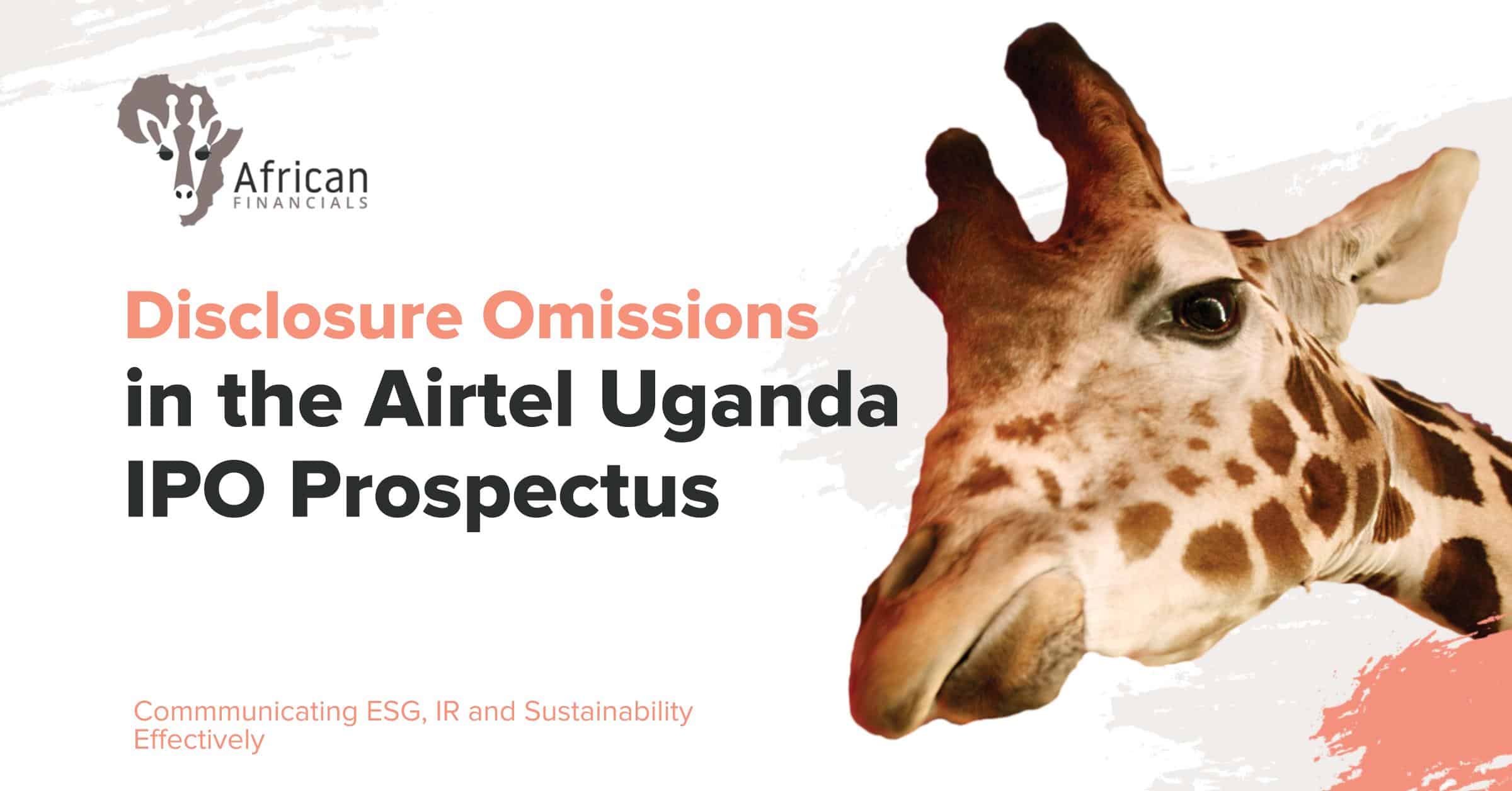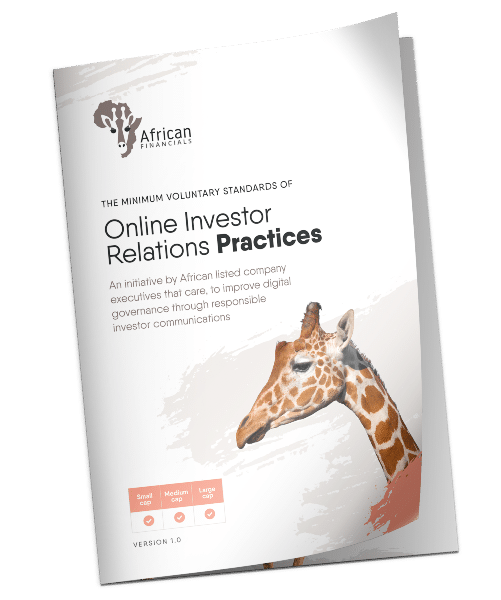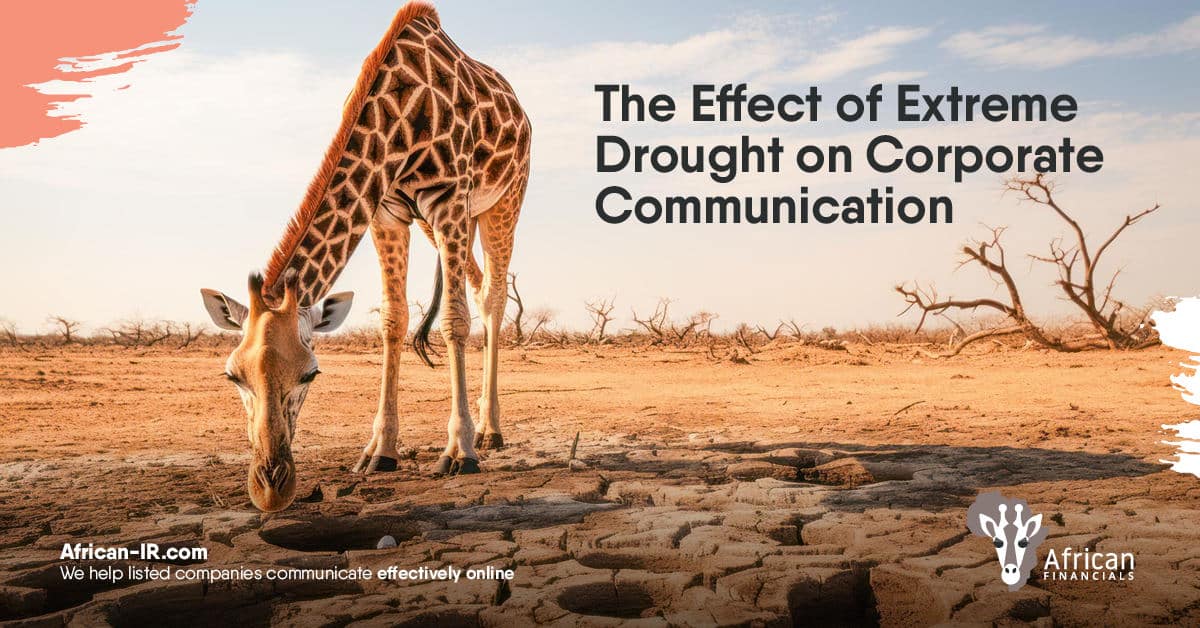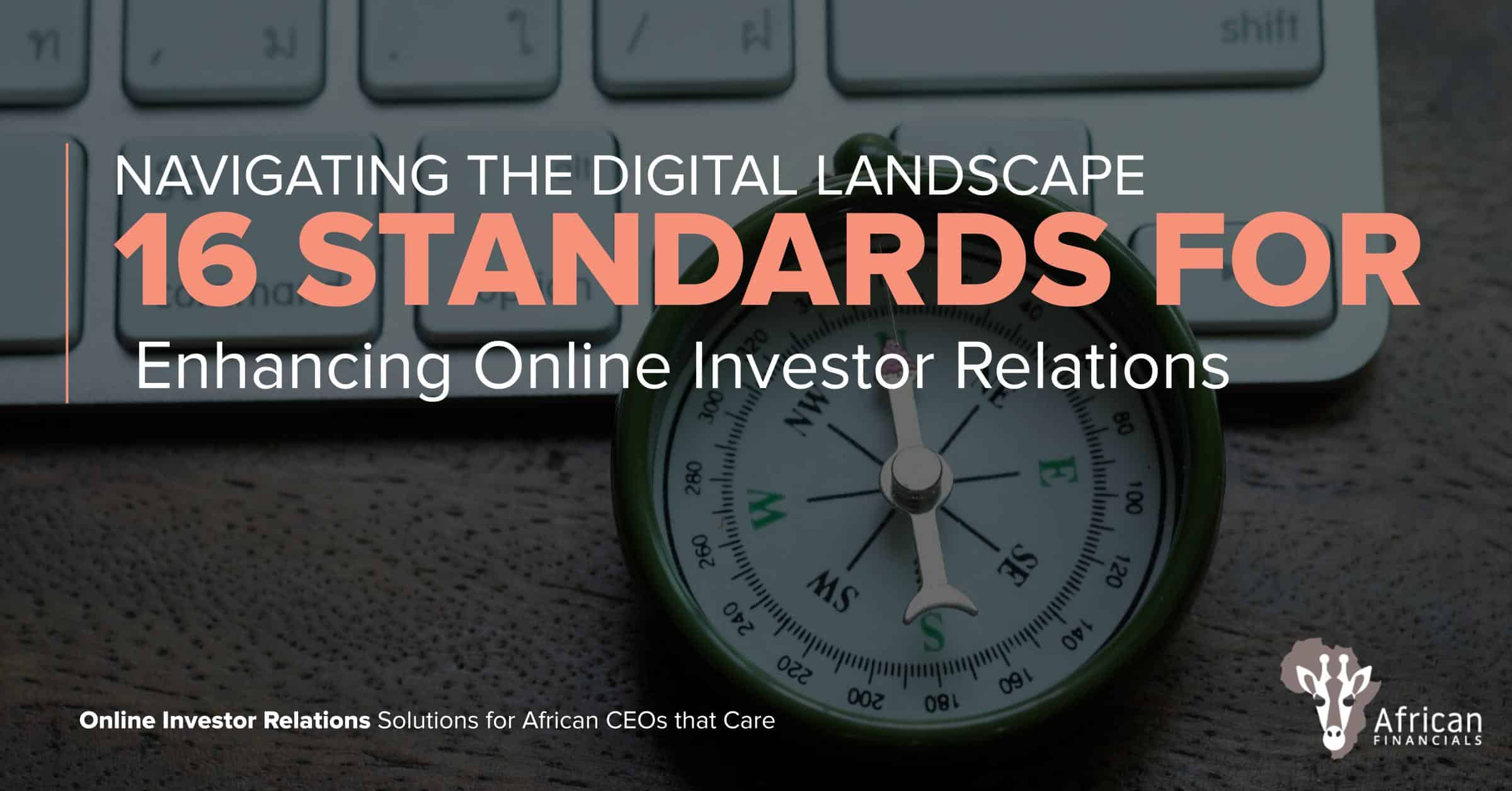
1. No disclosure and analysis of the MTN IPO results
The prospectus does not mention the potential negative impact of MTN Uganda’s recent initial public offering results.
As a direct competitor that completed its IPO recently, MTN Uganda’s IPO provided relevant information not included in Airtel Uganda’s prospectus regarding investor demand and pricing of telecom IPOs in the Ugandan market.
Why is this critical? The results of the MTN Uganda IPO and the resultant reduction of US$ of shareholder value will influence the decision of an investor to invest in Airtel Uganda’s IPO.
| UGXm | US$m | |
|---|---|---|
| Value of 100% of MTN Uganda at IPO Price | 4,477,809 | 1,255 |
| Value of 100% of MTN Uganda now | 3,806,138 | 1,024 |
| Total Company Value Loss | 671,671 | 230 |
| % Reduction of Company Value | 15% | 18% |
| Value of Shares Applied for at IPO price | 580,401 | 163 |
| Value of Shares Applied for – value now | 493,341 | 133 |
| Total Value Loss of Shareholders: IPO | 87,060 | 30 |
| Value of Shares Traded from Listing Date | 21,111 | 5.7 |
2. No disclosure on market capacity
The prospectus does not address the potential lack of capacity in the Ugandan Securities Exchange (USE) to successfully absorb and trade the significant value of Airtel Uganda’s shares offered, amounting to US$213 million. There is a “catch-all” disclaimer that share prices may fall however.
The ability of the USE market to handle an IPO of this size without negatively impacting share price or liquidity was not sufficiently discussed. The value of the Airtel IPO is 30% higher than the value of MTN Uganda’s IPO subscriptions.
Why is this critical? Airtel Uganda’s IPO size is extraordinary, and, therefore, material. Comprehensive disclosures were made about the Uganda telecoms industry and economy, not Uganda’s capital markets.
3. No meaningful disclosure of the NTO licence for adverse IPO results
The basic terms and conditions of Airtel Uganda’s National Telecom Operator licence as it relates to adverse IPO results were not adequately disclosed
The prospectus mentioned that an IPO was mandatory and 20% of shares had to be sold, but did not discuss the potential consequences or impact on the licence if the IPO was undersubscribed and the 20% sale requirement was not met.
Why is this critical? Will the company lose its licence, or will the selling shareholders be required to continue selling into a market with limited demand (which dampens the share price), or will the selling shareholder be exempted from any further obligation to sell down?
In all three cases, loss of NTO licence, majority shareholder post-IPO overhang and selling shareholder exemption from the share sale (after a less than fully subscribed offer) significantly influence an investor’s decision. These impacts are not disclosed in the risks section or given prominence. One outcome is disclosed however: IPO may be cancelled and monies returned – this is permitted in terms of the prospectus and could be the outcome. Will that be the case?
4. No reasons given for no underwriting the offer for sale
The prospectus did not explain why the IPO structure did not include the more conventional approach of engaging an independent underwriter, who would earn a fee for guaranteeing the sale of all offered shares.
The rationale behind forgoing an underwritten offering was not disclosed. This is a fundamental investor protection practice and it was ignored or omitted.
Why is this critical? The existence or non-existence of third underwriting of the offer for sale can influence an investor’s decision, particularly retail investors, who seek comfort that professional investors underwrite to earn a commission, not to invest. As a previous adviser to IPOs, I regularly negotiated a private placement to institutional investors as an incentive to the institution to also underwrite the offer for sale.
Underwriting the offer for sale would have been the simplest capital market structure, to mitigate the risk of a failed IPO and protect the investors to whom the IPO was targeted: Ugandans and retail investors.
“7.12.7 Underwriting
The Offer is not underwritten. The Selling Shareholder has opted to exercise its discretion not to underwrite the Issue.”
The underwriting disclosure in Airtel Uganda’s prospectus is erroneous: it refers to the selling shareholder not underwriting the “issue” of its own shares: the IPO is an “offer for sale” and not an “issue of new shares”.
5. No disclosure of peer or company valuation parameters
The prospectus omits key valuation metrics and ratios for comparing Airtel Uganda to regional industry peers, including MTN Uganda.
Why is this critical? Appraising a share valuation and IPO pricing should be simple and transparent. Typically, a valuation is presented and a discount applied to ensure an active market. By offering multi-tiered “free shares” (a commercially oriented marketing gimmick), the presentation of a valuation and IPO pricing at a discount is obfuscated. Furthermore, the Advisor’s share valuation report was not disclosed in the Documents Available for Inspection. Neither were valuation data points (PE Ratio etc.) summarised in the prospectus. The adoption of “average” valuations was adopted by the Lead Transaction Adviser. Valuation by “averages” is not an accepted valuation method.
The disclosure omissions above are more serious considering Airtel Uganda’s high relative valuation which includes an upcoming significant dividend. Airtel Uganda is going to have a significant PR and IR problem if the
- Share price falls as a result of an under-subscription
- The share price goes proforma ex-div after the next dividend
Our attached valuation, see the next social media post, of Airtel Uganda vs. MTN Uganda shows prima facie the significant over-valuation of Airtel Uganda at the IPO price. Is this premium in valuation a result of the dividend policy? If so how much?
The disclosure of valuation parameters directly influences the decision of investors to seek advice, and, or, to invest or not.
6. No disclosure of a proforma statement of changes in equity: forecast to 31 Dec 2023
Airtel Uganda discloses the 2023 year end equity, the estimated next year’s dividend of UGSH 500 billion, and a 3rd quarter dividend, and the beginning period (May 2023) equity, but no summary reconciliation of the movement in equity in between these dates.
Neither is an explanation of the effect of the dividend in the period between May 2023 and December 2023 given.
If the IPO share valuation was priced to include around the current and future dividend policy this should have been better explained up front.
Why is this relevant? Dividends and a drastic fall in equity are critical disclosures likely to affect the decision of an investor to invest.
The high relative valuation (the parameters of which are not disclosed) arising from the high forthcoming annual dividend and the anticipated share price adjusting for after the quarterly dividend is paid, should be explained clearly.
The net result of this is that the IPO price results in a Price to Book Value ratio of +600 times.
What obligation does the selling shareholder have to stakeholders in the IPO?
This is a verbatim disclosure from the Risks Section of the Prospectus:
Section 8.1 – Risk Factors
8.5.5. Airtel Africa is not required to support the Company financially nor act in the best interests of the Company’s minority shareholders or the Company when exercising its majority shareholder rights. Additionally, Airtel Africa may take part in activities that are in opposition to these interests. The other shareholders of the company might be harmed by the actions that Airtel Africa may decide to take if their interests and Airtel Africa’s interests are at odds, or if Airtel Africa decides to force the company to pursue strategic objectives that are at odds with their interests (whether because of the way their businesses are different or for other reasons).
The Company is committed to applying the highest standards of governance. Following the Offer and the Listing, the composition of the Board will be reviewed to ensure compliance with the recommended practices on Board balance, size, structure and sub-committees.
The Airtel Uganda IPO should Introduce the Concept Of “Sustainable Investing in Future IPOs”
Basic capital markets investor protection IPO structures have been omitted or ignored. Core disclosures such as valuation, effect of future dividends and MTN Offer Results have been omitted.
The Airtel Uganda IPO is selling too much stock into a market that can’t absorb it and the communications around the complexities around the forced sale are not addressed adequately.
The investors who may suffer are those directly targeted in the marketing campaigns – Ugandan and retail investors.
The regulators could have better considered investor protection as part and parcel of the IPO structure (but then their role would conflict with the role of the telecoms regulator forcing the sale on Airtel Uganda)
The IPO transaction structure sets to benefit the selling shareholder who satisfies the forced sale requirement and gets to retain the NTO licence and the additional shareholding to the extent that the IPO is under-subscribed (as a result of an over-valuation and the absence of underwriting of the offer for sale).
“It’s time to bring the concept of sustainability to African capital markets and define “sustainable investing” and mirror corporate responsibility that companies have in their general behaviors to be relevant to equity investors”
An Independent Expert’s View
“Rob, that sort of sums up one of the problems with emerging markets. They market the stock offerings to maximize the return to the company/government owner with little consideration of the buyers and creating an active market where investors can turn a profit.
I know in many cases it is driven by a belief that something is worth X amount (or they need X amount in proceeds) even though the market says it is only worth X-2. But they will get their X no matter what, and that has led to stagnant markets and investors staying away in droves. – STEVE TAYLOR
Steve Taylor advises smaller public companies to help them grow by navigating the US securities regulatory system and capital markets while crafting disclosure that connects with investors.
He is passionate about growing smaller companies at each stage, from start-up and incorporation to going public to an Exchange listing. Steve has over 20 years of US securities compliance experience and 30 years of experience in smaller public company finance and capital markets.
The Definition of “Investor Relations” from NIRI in the US (as amended)
“Investor relations is a strategic management responsibility that integrates finance, communication, marketing and securities law compliance to enable the most effective two-way communication between a company, the financial community, and other constituencies, which ultimately contributes to a company’s securities achieving fair valuation and improving its overall reputation.”
The Common Law Perspective
This quote from the book Standard Boardroom Practice, prepared by the Institute of Directors, London, revised 1971 is still appropriate (or perhaps more appropriate) in modern times:
“Although the process of encouraging shareholders to take an interest in the affairs of the company may be a rather slow one, directors should not be discouraged. It is their duty to make the maximum use of the methods open to them of keeping the shareholders informed.”
The IOD was defining “investor relations” at a time when the concept was only just emerging.
THE MINIMUM VOLUNTARY STANDARDS OF
Online Investor Relations Practices
Building effective online investor relations in emerging African markets presents unique governance challenges for public companies. Our guidelines aim to help these companies leverage their stock exchange listings and overcome communication hurdles.
Get a Copy



